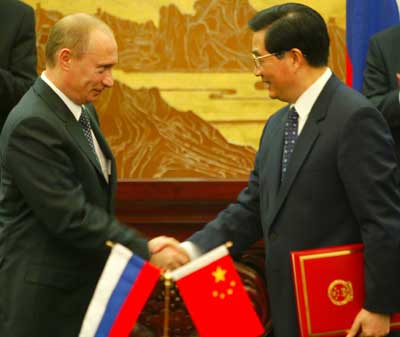Hopes are high that China and Russia will agree during Russian President
Vladimir Putin's upcoming visit to Beijing to build an oil and gas pipeline.

President Hu Jintao (R) and visiting Russian President Vladimir
Putin shake hands after the signing of a joint statement in Beijing in
this photo taken in October, 2004. [newsphoto] |
The two-day visit beginning Tuesday comes as the giant neighbors enjoy
increasingly warm ties and rising bilateral trade.
Aside from the pipeline and trade, the Iran and North Korea nuclear standoffs
and anti-terrorism cooperation will be high on Putin's agenda, Russian and
Chinese officials said at press conferences in Beijing last week.
Of highest interest for China is gaining a stable source of oil and gas from
Russia, the world's second biggest oil exporter after Saudi Arabia, to feed its
booming economy.
Russia plans to deliver 15 million tons of crude -- an increase of 25 percent
-- to China by rail this year.
But China is counting on the pipeline, which Russia has said it would start
building from Siberia to the Pacific Rim this year, to deliver much more.
While Moscow has said supplies will reach China, Beijing is lobbying for a
branch of the pipeline to go directly to the Chinese border amid nervousness
that Japan will receive preferential treatment.
Corporations from Russia and China have begun negotiations, but talks have
yet to yield results.
Zhu Feng, a professor at the Beijing University School of International
Studies and a respected Chinese expert on regional issues, said there could be a
deal signed during Putin's visit.
"The possibility of signing a Siberia-China pipeline agreement is very
big," Zhu said.
Negotiations had been stalled over who would pay for the
construction, but Zhu said the two sides may have come to an agreement that China would pay
for most of it, as most of the branch would fall in Chinese territory.
"What I've heard is the part in China will be paid by China and the part in
Russia will be paid by Russia," Zhu said.
"Construction could begin late this year or early next year."
Other analysts, however, are not so sure, citing the difficult issues of how
much supply Moscow would guarantee China and Japan, and whether Siberia had
enough oil to satisfy both Asian economies.
"I don't know if there's enough oil coming through the pipeline to make both
sides happy," said David Zweig, an expert on Asian energy politics at the Hong
Kong University of Science and Technology.
Currently eight percent of China's energy needs come from Russia, compared
with 45 percent from the Middle East.
Beijing hopes to boost Russia's share to around 15
percent with the pipeline in three to five years, Zhu said.